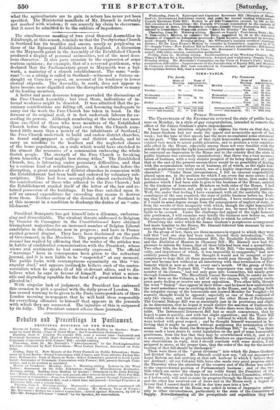The simultaneous nteating of two rival General A.ssembliea in Edinburgh,
at this season, reminds us that the Presbyterian Church in Scotland has its troubles and omens, nearly as perplexing as those of the Episcopal Establishment in England. A discussion on the Maynooth grant in the Assembly of the Established Church produced a display of personal animosities, not of the most deco- rous character. It also gave occasion to the expression of some curious opinions • for example, that of a reverend gentleman, who declared that the Parliamentary grant to Maynooth was a bul- wark, a mainstay of a church establishment. The same " sede- runt "—as a sitting is called in Scotland—witnessed a furious on- slaught on Corn-law repeal, on account of its tendency to lower clerical stipends. The Assembly, in Booth, does not appear to have become more dignified since the disruption withdrew so many of its leading members.
A better and more decorous temper pervaded the discussions of the Free Church Assembly ; but even there, indications of in- ternal weakness might be descried. It was admitted that the pe- cuniary contributions are falling off, and becoming inadequate to carry out the work the Free Church has taken in hand. In the fervour of its original zeal, it in fact undertook labours far ex- ceeding its powers. Although numbering at the utmost not more than one-third of those who were members of the Established Church before the disruption, (and even then the Church num- bered little more than a moiety of the inhabitants of Scotland,) the Free Church undertook to build and endow district churches, to found and ?support a college and district schools, and to carry on missions to the heathen and the neglected classes of the home population, on a scale which would have stretched to the utmost the resources of a communion embracing the whole Scotch people. The strength of the Free Church is breaking down beneath a "load might bow strong. Atlas." The Established Church, too, is labouring under pecuniary difficulties, and that by a curious kind of retributive justice. A short time before the disruption, a great number of district churches in connexion with the Establishment had been built and endowed by voluntary sub- scriptions. This had been accomplished almost exclusively by the contributions of -those who adhered to the Free Church ; but the Establishment availed itself of the letter of the law and re- tained possession of the buildings. It has thus entailed upon it- self an annual expenditure far exceeding any means it derives from them. Neither section of the disunited Kirk of Scotland is at this moment in a condition to discharge the duties of an "esta- blishment."


























 Previous page
Previous page